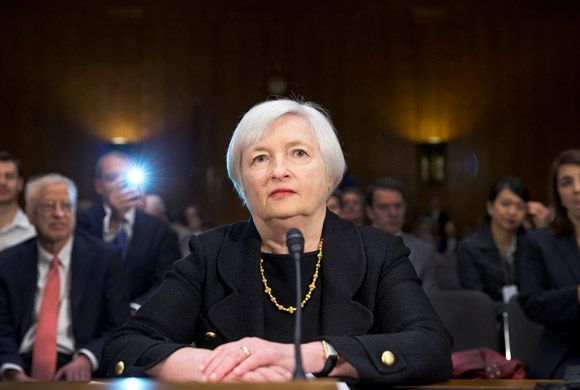
America's economy has recovered from the Great Recession by just about any yardstick. Is it perfect? No. But we are not in the middle of a crisis anymore, which is what 0% interest rates signify.
At a time when the U.S. economy is chugging along at over 2% growth and the unemployment rate reflects almost full employment, there's not much of a case for the Fed's key interest rate to remain at historic lows.
If you listen to some Wall Street pundits and economists, you might think that the Fed raising interest rates right now would cause disaster to strike -- it could send the global economy into recession and the stock market crashing.
If the Fed votes on Thursday to raise its benchmark rates, most likely it will go from being near 0% to maybe 0.125% or 0.25%. This first rate increase in years is more about psychology than finance or economics. The Fed has kept rates so low for so long that people are scared of any change.
The stock market has been swinging wildly in recent weeks at every hint that rates might increase. For the past 10 weeks, the stock market has gained one week and lost the next, partly because of the Fed.
This is not healthy. Keep in mind the Fed has been giving huge hints that it will raise interest rates sometime in 2015 for almost a whole year. In fact, you could argue they've been telegraphing this since 2012 when their forecasts started showing that Fed members believed interest rates would be higher than 0% by the end of 2014.
The bottom line is that the Fed has to act at some point. As with any big decision, there will always be hand wringing over finding the perfect time. It's best to rip the Band-Aid off now. If the Fed delays yet again on raising rates, it will probably just increase stock market turmoil. Already investors are asking -- if not now, will it be October? December? 2016?
The general consensus is that there's about a 50/50 chance the Fed will hike rates Thursday. In Wall Street terms, that means a rate increase is more or less already priced in.
Sure, there will likely be some market reaction (selling) right after any announcement of higher rates. But most likely people will gasp and then relax and realize the world hasn't ended or shifted that much after a 0.25% change.
The real key isn't the initial rate hike. It's what happens after that. Does the Fed continue to raise rates at its next few meetings or does it release the valve slowly and only hike two or three times in the next year?
The pace of the hikes is what people should be focused on, but they won't do that until the first rate hike is over. The question isn't whether it's the perfect time, it's whether it's a good enough time to act. Right now, the U.S. economy and the markets appear ready -- or, at least, as ready as they're likely to get.
A rate hike now sends the world the following messages: 1. The U.S. economy is better and we don't need 0% rates forever. 2. The Fed is not going to get all stirred up by every stock market blip. 3. The Fed has taken the first step -- so let's all breathe and start having a real conversation about what's next.
Ask us about our FREE financial advice program: ![]()
Other Top Stories:
Technical Analysis Lesson 1 - Introduction
How I Made Over $30,000 a Year by Investing in Binary Options
Follow us and SHARE this story on Facebook: ![]()


